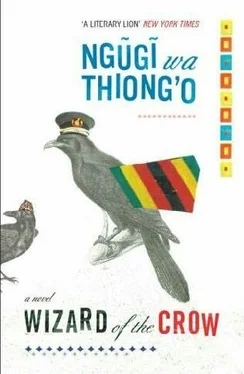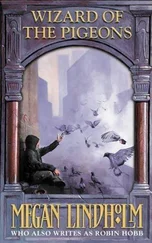Nothing could have prepared Kamltl and Nyawlra and the entire Movement for the Voice of the People for what had happened in Aburlria, the Ruler’s SID particularly. He had survived the absurdities of self-induced expansion, self-induced pregnancy, and certainly all the other previous attempts on his life, only to fall to masked spirits. That Nyawlra’s former boss and Kamltl’s tormentor had successfully carried out a palace coup was stunning, to say the least, and Kamltl could not help but recall that other time when Tajirika escaped from prison with a bucket of shit between his legs.
“But shit is still shit, even by another name,” commented Nyawlra. “The battle lines may be murky, but they have not changed.”
One evening Nyawlra told Kamltl that two men would come for him on the following day and take him to meet the Central Committee of the Movement for the Voice of the People so that he could say in his own words and from his own lips that he wanted to become a member. Kamltl was expecting them and yet was shocked a little. It was the first time since their last return from the mountains that he had seen another person enter their place, and he realized how much of a sheltered life he had been leading with Nyawlra, newspapers, and the radio his only windows to the world. The two escorts looked his age and there was a lot about which they could have chatted, but there was not much talk between them and Kamltl was left to his own thoughts. He reviewed his life since that fateful day when he flew out of his body at the city dumpsite, setting in motion subsequent happenings like his flight in time and space in bird form, that added to the miracle his life had become, making him wonder about the thinness of the line that divided the real and the unreal in human lives.
“We are already there,” said one of his guides, jolting Kamltl from his reverie.
His two escorts ushered him into a room, showed him a seat, and went into another room. Alone, Kamltl let his eyes pan the walls, over posters and drawings of some heroes and heroines of Aburlrian and African anticolonial resistance who were never mentioned in official documents. Then his eyes rested on a big map of the world with Africa at the center. On the map were red paper arrows pointing at cities circled with a black marker. He was contemplating these circles when he saw, at the Nile Delta, a neon-lit arrow. The arrow began to move down the map, and when it reached a town it would stop and flicker as if asking him to note the spot well. This was too unreal, and he stood up and went near the map to make sure. Yes, the arrow was moving along the trail he had followed and it flickered only at those towns he had visited in the body of a bird. What was the meaning of this?
“We are just trying to learn our history,” Kamltl heard a voice say, and he quickly turned around to face six men and four women. One of them was speaking to him as the others listened. “We try to locate our origins and know all the places to which black people have been scattered, from India, where dwell the Siddis, to Fiji in the Pacific, where the people claim Tanganyika as the site of their origins.”
“And what about this flickering arrow?”
“Which arrow?” the man asked, wondering what Kamltl was talking about.
Kamltl looked back at the map and was surprised to find that the neon arrow was not there.
“Oh, I was thinking about these red arrows,” Kamltl said, as if the matter was not of consequence.
“Those arrows are pointing at the centers of ancient black civilization,” the man said. “They are the sources of black power.”
They sat down in a semicircle. Again, Kamltl could not believe his eyes. Were these not the ones who used to work at the shrine? However, he now kept his thoughts to himself in case his mind was deceiving him again. The man said that they were still waiting for the chairperson, but even before the man had finished-was Kamrö dreaming or not?-Nyawlra entered.
“The chairperson of the Central Committee of the Movement for the Voice of the People and commander in chief of Aburlrian People’s Resistance…”
The comrades took him on a tour, a journey imbued with magic more potent than that in Maritha’s story of suspended motion and suffused with wonders more amazing than those in the healing laughter of Maritha and Mariko. Here, in the new venture, the extraordinary, the magical, the wonderful, and even the strange came out of the ordinary and the familiar. His guides were those he had always known as workers in the shrine. But they now looked different. Nyawlra looked different. He was seeing the Eldares Mountains anew through other people’s eyes.
They took him to their farms where they grew foods, millet, sorghum, yams, and arrowroots, as well as varieties of Aburlrian berries. Elsewhere Aburlrian soil was dying from being doused with pollutants, imported fertilizer. Here they were working with nature, not against it. The forest was a school to which they often came to hear what it had to tell them: You take, you give, for if you only take without giving back, you will leave the giver exhausted unto death. The gardens were nurseries for healing plants with seeds that could be planted on farms elsewhere; the healing of the land had to start somewhere.
They took him to a cave on the other side of the falls, perhaps even one he had once shown Nyawlra. It had been turned into a living space. Three men and two women, guns slung on their shoulders, received them. We do a few drills here, Nyawlra explained, as if reading Kamltl’s mind. One of the men there took up the narrative.
The so-called national army is a colonial institution. It was trained to hate its own people. The soldiers hate even themselves, shorn as they are of national pride. Those trained-to-kill nationalists fighting for freedom, how can they feel for the nation whose emergence they fought? They pass these attitudes to new recruits, the young. In time, these traditions of self-hate rooted in colonial times become the everyday. Our motto, a girl said, is simple: a New Army for a New Aburlria, not with the gun guiding politics but a politics of unity guiding the gun, to protect laws for social justice. These weapons are to protect our right to political struggle and not a substitute for political struggle.
Another man took up the thread: You see, despite our insurgency so far, we have not been able to hold the agents of the regime accountable for murdering our people. Nyawlra added: There will surely come a day when we shall make it impossible for these armed ogres to go about their work of terror without suffering consequences. We shall then fight on our terrain, which is the people who must know and believe that we aim only to defend them and protect their right to a better life.
They took him through underground passages to yet another cave, a large room full of books. The Ruler and now the Emperor hated books and ideas that came from within, they explained.
“We believe that all knowledge is our inheritance, but we also have a duty to add to the common store. The right to receive, the duty to give.”
Yes, words that he and Nyawlra had used, but now confronting him with all the power of their estrangement. Maybe knowledge was nothing more than the art of looking at what we already know with different eyes, and asking different questions. Knowledge is the discovery of the magic of the ordinary. Like words put into song. He was so absorbed in these thoughts about what was being said that he did not realize that he had been led to another spacious complex: a hospital, a replica of the shrine.
“We transported everything to this place,” Nyawlra said, reading his mind again. “This is where we first brought you on the night they shot you. This is where you were operated on and the bullet extracted. We want you to take charge of the facilities and develop it as a nursery of health and clean living in accordance with the Seven Herbs of Grace. We are trying to imagine a different future for Aburlria after people united take power from these ogres… Dr. Patel who did the surgery is not here today but…”
Читать дальше












